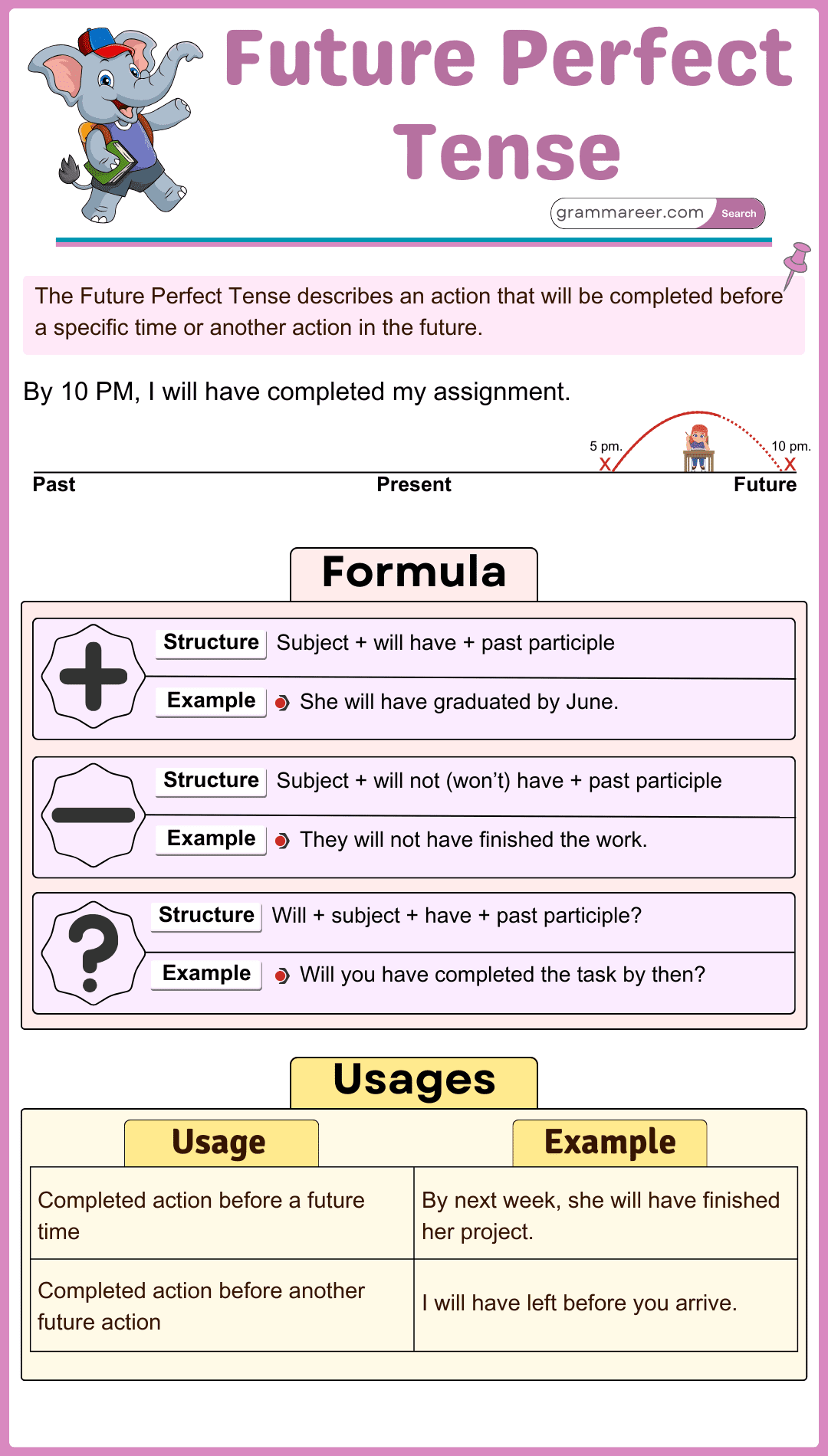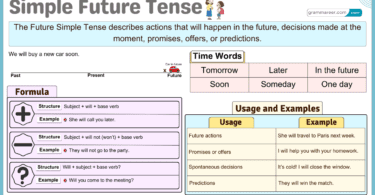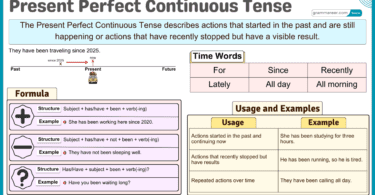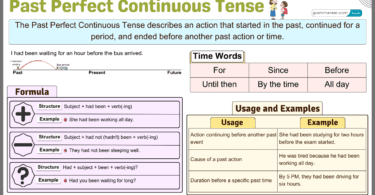The Future Perfect Tense is an essential part in English grammar, used to describe actions that will be completed before a certain time in the future. It emphasizes the completion of an action rather than the action itself. This tense is helpful when talking about deadlines, achievements, and future expectations. Learning its structure and usage enhances your ability to express future events clearly, while also improving your grasp of tenses.
Table of Contents
Sentence Structures of the Future Perfect Tense
The Future Perfect Tense has three main structures: affirmative, negative, and interrogative sentences.
Affirmative Sentences
Structure: Subject + will have + Past Participle + Object
Examples:
- Aisha will have completed her project by tomorrow.
- They will have traveled to five countries by next year.
In both examples, will have is used with all subjects, followed by the past participle of the main verb.
Negative Sentences
Structure: Subject + will not have + Past Participle + Object
Examples:
- Bilal will not have finished his homework by 8 PM.
- We won’t have visited all the museums by then.
The contraction won’t have is commonly used instead of will not have.
Interrogative Sentences
Structure: Will + Subject + have + Past Participle + Object + ?
Examples:
- Will Hamza have completed his assignment before the deadline?
- Will they have arrived at the station by 9 AM?
Double Interrogative Sentences
Structure: Question Word + will + Subject + have + Past Participle + Object + ?
Examples:
- What will Fatima have achieved by the end of this year?
- Where will they have gone before the meeting starts?

Subject-Verb Agreement in Future Perfect
In the Future Perfect Tense, will have is used with all subjects, both singular and plural.
| Subject | Helping Verb | Main Verb Example |
|---|---|---|
| I | will have | will have finished |
| You | will have | will have played |
| He/She/It | will have | will have written |
| We/They | will have | will have learned |
| The teacher | will have | will have explained |
| My parents | will have | will have traveled |
Time Expressions in Future Perfect
Time expressions in the Future Perfect Tense help specify when an action will be completed in the future. They provide clarity about the deadline or time frame by which the action will have been finished.
- By tomorrow: She will have submitted the report by tomorrow.
- By next year: They will have graduated by next year.
- Before: I will have finished my work before you arrive.
- By the time: By the time we get there, he will have left.
- In two hours: She will have completed her homework in two hours.
Adverb Placement in Future Perfect
Adverbs like already, just, yet, probably, definitely are placed between ‘will’ and ‘have’.
Examples:
- She will probably have completed the task by now.
- They will definitely have arrived by the evening.
Uses of the Future Perfect Tense
The Future Perfect Tense is used to describe actions that will be completed before a specific time or event in the future. It is formed using will have + past participle of the verb.
1. Actions Completed Before a Specific Time in the Future
It describes actions that will be finished by a certain point in the future.
- By 10 PM, she will have finished her homework.
- They will have left the office before we arrive.
2. Actions Completed Before Another Future Action
It is used to show that one action will be completed before another future event happens.
- She will have cooked dinner before they get home.
- I will have written the report by the time the meeting starts.
3. Emphasizing the Duration of an Action Up to a Future Point
It can highlight how long something has been happening up to a specific future time, often with for and since.
- By next year, they will have lived here for a decade.
- He will have worked at the company for five years by 2025.
4. Making Assumptions About the Past from a Future Perspective
It expresses assumptions or guesses about something that is likely already completed by now or will be completed soon.
- She will have arrived at the airport by now.
- They will have completed the project by this time tomorrow.
Future Perfect Tense vs. Future Continuous Tense
The Future Perfect Tense describes an action that will be completed before a specific future time, while the Future Continuous Tense refers to an action that will be in progress at a specific time in the future.
| Feature | Future Perfect Tense | Future Continuous Tense |
|---|---|---|
| Usage | Action that will be completed before a future point. | Action that will be in progress at a future time. |
| Time Ref. | Before a future time (by tomorrow, by next year). | Specific future time (at 5 PM tomorrow, next week). |
| Example | I will have finished the project by Friday. | I will be working on the project at 5 PM tomorrow. |
| Formation | will have + past participle (She will have completed.) | will be + verb-ing (She will be working.) |
| Focus | Completion of an action before a future moment. | Ongoing action at a future moment. |
| Signal Words | By, before, by the time, until. | At this time tomorrow, next week, soon. |
| Context | They will have left by 10 AM tomorrow. | They will be traveling at 10 AM tomorrow. |
Short Answers in Future Perfect
Short answers help in conversations. Below is a table with examples:
| Question | Short Answer |
| Will you have finished the task? | Yes, I will. |
| Will she have arrived by noon? | No, she won’t. |
| Will they have visited us? | Yes, they will. |
| Will Ahmed have studied enough? | No, he won’t. |
Question Tags in Future Perfect
Question tags are short questions added at the end of a sentence to confirm information or seek agreement.
| Sentence | Question Tag |
| You will have completed the work, won’t you? | won’t you? |
| He will have written the report, won’t he? | won’t he? |
| They will have arrived, won’t they? | won’t they? |
| She will have finished, won’t she? | won’t she? |
Examples of Future Perfect in Use
Here are more examples to help you understand the Future Perfect Tense:
- Affirmative:
- Hassan will have eaten lunch by 2 PM.
- We will have lived in Karachi for five years by next June.
- She will have joined the new company by next month.
- Negative:
- She will not have completed the project by tomorrow.
- They won’t have attended the meeting by then.
- Ahmed won’t have agreed to the proposal.
- Interrogative:
- Will you have finished the report by tonight?
- Will Hina have called her friend by this evening?
- Will they have traveled abroad before next year?
Common Mistakes with Future Perfect
Many learners make errors in this tense. Here are some common mistakes and their corrections:
- ✅ She will have gone to the market.
- ❌ She will has gone to the market.
- ✅ They won’t have eaten lunch.
- ❌ They will not eating lunch.
- ✅ Will you have seen that movie?
- ❌ Will you seeing that movie?
- ✅ The baby will have slept by 10 PM.
- ❌ The baby will sleeping by 10 PM.
FAQs
To describe actions that will be completed before a certain future time.
Example: “Ali will have finished his homework by 8 PM.”
Subject + will have + past participle + object.
Example: “She will have completed the report.”
Subject + will not (won’t) have + past participle + object.
Example: “He won’t have arrived yet.”
Will + subject + have + past participle + object?
Example: “Will you have finished the task?”
I have finished my homework already.
She has visited Paris three times.
They have lived in this city since 2015.
We have just eaten lunch.
He has lost his keys and can’t find them.
The movie has started, so let’s hurry.
Have you ever seen a shooting star?
She has worked at that company for five years.
You May Also Like




